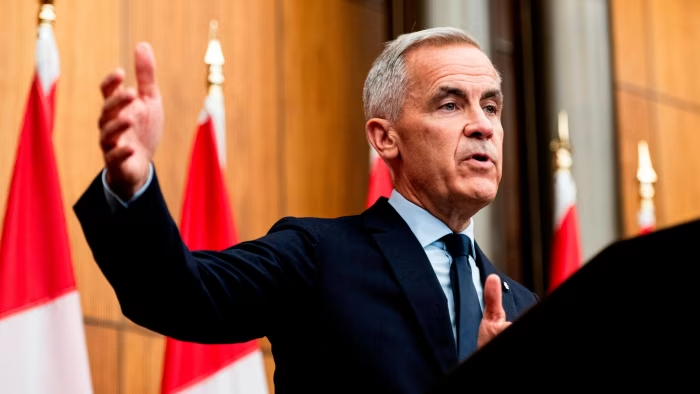Unlock the White House Watch newsletter for free
Your guide to what Trump’s second term means for Washington, business and the world
Canada does not expect Donald Trump to drop all his tariffs on the country, officials have said, despite Mark Carney’s move to slash levies on US imports in a bid to win a trade deal in Washington.
Dominic LeBlanc, Canada’s top trade official with the US, led a delegation to Washington this week after Ottawa scrapped retaliatory tariffs on billions of dollars’ worth of American goods.
The group met Trump’s commerce secretary Howard Lutnick, among other officials — but left without a deal.
While officials involved in the negotiations said there had been “progress in the talks”, numerous “technical matters” still needed to be resolved and Ottawa no longer expects to secure the full tariff relief it seeks.
“We are discussing the five strategic sectors — steel, aluminium, autos, copper, softwood lumber and the opportunities we see for collaboration and win-win partnerships in those sectors and others,” said a Canadian official familiar with the discussions with Lutnick on Tuesday.
Prime Minister Carney and Trump also spoke on the phone last week about their countries’ $941bn annual trading relationship. Most of Canada’s exports go to its southern neighbour and it is the US’s second-largest trading partner.
A day after the leaders’ call Carney announced he would lift most of his country’s retaliatory tariffs on the US from September 1. Canada’s reciprocal steel and aluminium duties remain in place.
“More than 85 per cent of Canada-US trade is now tariff free,” Carney said last Friday.
But his failure to secure more US tariff carve-outs or a comprehensive deal like those struck by other countries leaves Canada paying steep levies on goods that are not covered by the USMCA, its trade pact with Mexico and the US.
Special duties have targeted crucial exports such as steel, autos and aluminium.
The lack of a deal has sparked some criticism of Carney, whose Liberal party won election in April with a pledge to defy Trump with “elbows up” to see off Trump’s threat, referring to how aggressive ice hockey is played. Canada was early in imposing its own retaliatory tariffs on the US.
The stance won some plaudits for its pluck. But after the EU struck a deal with Washington and China and the US paused their trade war, Carney was left isolated.
“When the Canadian government introduced these counter-tariffs, it did so based on the assumption that other countries, specifically the other G7 countries, would retaliate also. But that didn’t happen,” said Goldy Hyder, president of the Business Council of Canada.
The UK, Japan, South Korea, and other big trading partners have all struck deals, while Trump has given Mexico more time to find one. Canada is now among the last major US trading partners that have failed to secure a trade deal with the mercurial president.
The concessions Ottawa made last week were only the latest attempt to curry favour with Trump. In other instances Carney has gone out of his way to praise the American leader.
“I applaud the leadership of the transformative US President Donald Trump in creating the possibilities for peace,” Carney said during a visit to Ukraine last week.
In June, Canada also scrapped a digital services tax — a bugbear of US Big Tech companies — in a bid to reach a US trade deal by Trump’s July 21 deadline.
Carney also did not reciprocate when Trump doubled steel and aluminium tariffs to 50 per cent, dealing a major blow to Canadian exporters.
The gambits have not yet worked.
The prime minister’s “elbows have mysteriously gone missing”, said opposition leader Pierre Poilievre recently. “He’s not thrown one elbow since he took office.”
Catherine Cobden, president of the Canadian steel producers association, was “disappointed” that Carney had dropped the retaliatory measures at a time when US tariffs were affecting C$28bn ($20bn) in steel exports.
But others said Carney was acting out of necessity to protect his country’s economy.
“It was something of an inevitability,” said Brian Rathbun, a University of Toronto professor. “The countries that have gotten deals have been those countries that have been willing to make concessions.”
Brian Kingston, president of the Canadian vehicle manufacturers’ association, said Carney was showing some calculated pragmatism.
“You sometimes need to adjust your game plan partway through the period. All that matters is the final score. We urgently need to secure tariff relief for the auto industry,” he said.
Additional reporting by Aime Williams in Washington

